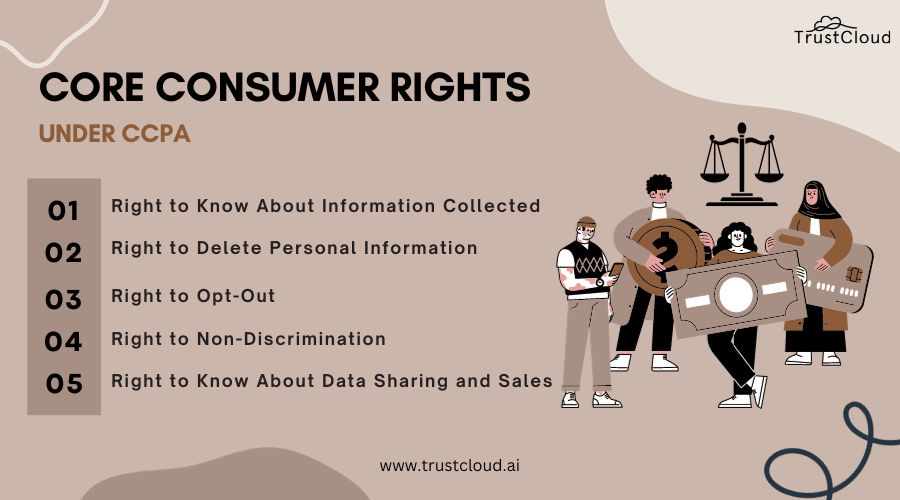In this article

Consumer rights under CCPA
In an age where data has become an integral part of our daily lives, the protection of consumer rights regarding personal information has gained paramount importance. The California Consumer Privacy Act (CCPA), enacted in 2020, stands as pivotal legislation designed to empower individuals with greater control over their personal data. At the core of CCPA are various consumer rights that afford Californians the ability to know, access, and control how their personal information is collected and processed by businesses. In this comprehensive guide, we delve into the intricacies of consumer rights under the CCPA, providing a detailed understanding of each right and offering practical insights for businesses to implement effective compliance measures.
Understanding the core consumer rights
- Right to know what personal information is collected
The CCPA grants consumers the right to request information about the categories and specific pieces of personal information that a business has collected about them.- Businesses should maintain detailed records of the types of personal information collected.
- Establish clear procedures for responding to consumer requests for information.
- Right to delete personal information
Consumers have the right to request the deletion of their personal information held by businesses, with certain exceptions.- Develop a process for verifying and responding to deletion requests promptly.
- Ensure that third-party service providers are also informed and compliant with deletion requests.
- Right to opt-out of sale of personal information
CCPA gives consumers the right to opt-out of the sale of their personal information. Businesses must provide a clear and accessible “Do Not Sell My Personal Information” link on their websites.- Implement user-friendly mechanisms for opting out of data sales.
- Regularly update opt-out lists and ensure third-party partners are compliant.
- Right to non-discrimination for exercising rights
Consumers have the right not to be discriminated against for exercising their rights under CCPA, including denial of goods or services, charging different prices, or providing a different level of quality.- Establish policies and practices that treat all consumers equally, regardless of their exercise of privacy rights.
- Educate customer-facing staff on non-discrimination policies.
- Right to know about data sharing and sales
Businesses must disclose to consumers the categories of personal information collected, the sources of information, the purposes of collection, and whether the information is sold or disclosed for business purposes.- Regularly update privacy notices to include comprehensive information about data sharing and sales practices.
- Provide accessible and clear information to consumers about data practices.
Practical implementation of CCPA consumer rights compliance
- Developing Robust Verification Processes
- Establish secure methods for verifying the identity of consumers making requests.
- Implement multi-step verification processes to prevent unauthorized access to personal information.
- Ensuring Transparent Data Collection Practices
- Clearly communicate to consumers the types of personal information collected and the purposes for which it is used.
- Update privacy policies to reflect accurate and detailed information about data collection practices.
- Implementing User-Friendly Opt-Out Mechanisms
- Integrate a prominent and easily accessible “Do Not Sell My Personal Information” link on websites.
- Regularly test and optimize the opt-out process to ensure simplicity and effectiveness.
- Educating Customer-Facing Staff
- Provide comprehensive training to customer service representatives on handling consumer rights inquiries.
- Develop a knowledge base for staff to access up-to-date information about consumer rights and compliance procedures.
Challenges and future considerations
- Adapting to regulatory changes and CPRA (CCPA 2.0)
- Stay informed about amendments to CCPA, including the California Privacy Rights Act (CPRA), and adapt compliance measures accordingly.
- Anticipate potential expansions of consumer rights and adjust internal processes accordingly.
- Global privacy standards and cross-border considerations
- Align CCPA compliance efforts with evolving global privacy standards to prepare for potential cross-border implications.
- Develop strategies for handling data transfers and ensuring compliance with international privacy regulations.
- Technological advancements and privacy by design
- Embrace privacy by design principles, integrating data protection measures into technological systems from the outset.
- Explore emerging technologies, such as privacy-enhancing tools, to enhance consumer rights protection.
Conclusion
As consumer awareness and expectations regarding data privacy continue to rise, businesses must proactively adapt to the evolving landscape of regulations like CCPA. Understanding and implementing compliance measures related to consumer rights not only ensures legal adherence but also fosters trust and loyalty among consumers. By prioritizing transparency, establishing robust verification processes, and staying abreast of regulatory changes, businesses can navigate the complexities of CCPA and contribute to a privacy-centric digital ecosystem. As CCPA evolves and potentially sets the stage for future privacy legislation, businesses that prioritize consumer rights protection will be better positioned to thrive in the era of data-conscious consumers.
Sign up with TrustCloud to learn more about how you can upgrade GRC into a profit center by automating your organization’s governance, risk management, and compliance processes.
Explore our GRC launchpad to gain expertise on numerous GRC topics and compliance standards.
